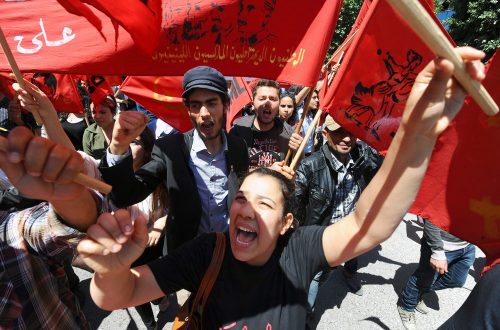This is a cross-post from CifWatch
A few hours before the Israeli government was set to approve a new deal with the Palestinians to extend peace talks till 2015 – which involved the release of the final batch of pre-Oslo prisoners, hundreds of additional prisoners and a partial curb in construction beyond the green line – the Palestinians signed letters seeking acceptance to 15 UN treaties and conventions, reneging on their agreement of July 2013 to refrain from making unilateral moves.
The last-minute breakdown throws the possibility that talks will proceed past the April 29 deadline into serious doubt, and was followed by additional Palestinian demands. These include Israeli recognition of the pre-1967 lines with east Jerusalem as its capital, the release of 1,200 more prisoners (including Marwan Barghouti), a complete cessation of settlement construction, the imposition of PA sovereignty over Area C, a halt to Israeli anti-terror operations in PA-controlled territories, and a lifting the arms blockade on Gaza.
Anyone who’s been closely following negotiations would understand that Palestinians were counting down the days until the April 29 deadline when they would be free to execute what Jerusalem Post correspondent Herb Kenion refers to as their Plan B – waging diplomatic warfare against Israel to isolate it, delegitimize it, and eventually force it through international pressure to give in to their maximalist demands.
Such a plan of political warfare is largely inspired by what’s known as the Durban Strategy, a declaration adopted in the 2001 NGO Forum of the UN’s Durban conference. The Durban campaign – itself the political successor to the Arab boycott launched in 1945, three years before Israeli statehood – featured numerous expressions of antisemitism, focused on labeling Israel an ‘apartheid state’ guilty of ‘ethnic cleansing’, ‘genocide’, and ‘war crimes’”, andadopted a resolution calling for the ”complete and total isolation of Israel…the imposition of mandatory and comprehensive sanctions and embargoes, [and] the full cessation of all links between all states and Israel.”
What’s known today as the modern BDS movement – which singles out the Jewish state, alone among the family of nations, for a coordinated campaign of boycotts, sanctions, divestment and social exclusion – was essentially born on that day.
Though the Guardian’s coverage of the region has consistently legitimized, amplified and provided succor the BDS movement, an op-ed published at ‘Comment is Free’ (A boycott can jolt Israelis from their somnolence on Palestine, April 4) explicitly endorsing BDS was noteworthy in that it wasn’t written by an anti-Zionist activist, but rather by one of their ‘serious journalists’ – their outgoing Jerusalem correspondent Harriet Sherwood.
To those of us familiar with Sherwood’s brand of activist journalism, it is not at all surprising that she has expressed her support for BDS, nor that – despite glaring evidence attesting to Palestinian refusal to budge on vital topics such as the long-term final agreement issues of refugees, mutual recognition, or even the demand that a final peace agreement include an end to all Palestinian claims against Israel – would be ignored.
What largely stands out in her polemical attack is the contempt she seems to possess for average Israelis. While she has eloquently expressed her affection for Palestinians, Israeli Jews – even after all this time in the country – clearly seem to stand beyond the limits of her imaginative sympathy.
The op-ed – illustrated with photo of privileged Israelis “soaking up the sun on a Tel Aviv beach”, oblivious to “the daily grind experienced by more than 4 million Palestinians” – begins by citing a few recent BDS victories before contending that BDS, in protest of its “47-year occupation of the West Bank, East Jerusalem and Gaza”, is gathering steam. Sherwood repeats a quote by Israel’s prime minister which attacked Europe and its “dark history” and demanded that “the boycotters must be exposed for what they are… classical antisemites in modern garb”, to which the Guardian journalist responds:
“This is a serious charge, and one that causes deep discomfort to many who want to bring pressure to bear on the Israeli government over its policies towards the Palestinians, but who also vigorously oppose antisemitism in any form. Opposing the occupation does not equate to antisemitism or a rejection of Jews’ right to, and need for, a homeland. The repeated accusation of antisemitism does not make it true, however frequently it is leveled by those who defend Israel unconditionally.”
Of course, Sherwood – who has never, in nearly four years of covering the region, addressed the issue of the extreme (and quite real) expressions of Judeophobia within Palestinian society – fails to explain why precisely the “accusations of antisemitism” against boycott advocates who often defend Palestinians unconditionally, are unfair. And, though she draws a distinction between BDS advocates who merely support boycotting ‘settlement’ goods and those who call for a complete boycott of the state, she doesn’t acknowledge that those who support the latter approach largely reject the right of the state to exist within any borders.
Finally, Sherwood writes about the increasing frustration felt “by Israel’s intransigence…and the failure of the international community to back up critical words with meaningful actions”, before concluding that “only when Israeli citizens and institutions feel the consequences of their government’s policies will they force change from within”. She argues that Israelis are “shielded from the [daily grind] of occupation”, before reaching the conclusion that “economic pain, isolation and global opprobrium” will surely force Israelis “to take notice”.
First, like so many journalists covering the conflict, Sherwood seems to take as a given the benign nature of Palestinian intentions despite so much evidence to the contrary, and doesn’t acknowledge that Israelis overwhelmingly support two-states for two peoples while refusing to ignore the failure of previous ‘land for peace’ guarantees and, therefore, remaining skeptical that the creation of a Palestinian state will actually bring peace.
More pertinent to the theme in Sherwood’s op-ed, Israelis – and most Jews around the world – indeed view current calls to exclude Israeli Jews from the international community in the context of the dark history of such measures. Such Jews naturally question the motivation of sophisticated (putatively progressive) Europeans who see the unimaginable violence and brutality meted out to Arabs by other Arabs in the Middle East – which includes the systemic violation of the rights of women, gays and political dissidents, and (in some cases) industrial-scale killing and torture – and yet believe that the only country whose citizens deserve to be boycotted just so happens to be the only one with a Jewish majority.
The duplicity of pro-Palestinian activists is represented not merely by the manner in which they gain support from the liberal-left despite the decidedly illiberal nature of the Palestinian national movement, nor the way they promote an understanding of the dispute which conflates cause (the more than 70 year Arab war against the Jewish state) with effect (the territorial dispute which only came about as the result of that war). No; their supreme deceit relates to how they manage to convince so many within the opinion elite that – unlike every other time in history – this time those campaigning for the exclusion of Jewish professionals, academics and artists are morally justified; that this time a small community of Jews can truly represent an organic obstacle to peace and progress; that this time it truly is malevolent Jewish behavior that brings about measures singling out Jews for opprobrium and sanction.
However, though many Zionists are secular, most thankfully are imbued with a rich and edifying tradition which explains that ‘What has been will be again, what has been done will be done again; and there is nothing new under the sun’. Try as they may, no degree of sophistry employed by boycott proponents can possibly convince us to accept the supremacy of the au courant morality over the ethics of our fathers, to not see this latest political attack through the lens of Jewish history, nor to avoid reaching the conclusion that – as in every generation – resistance to their assault will be fierce and, in time, succeed.
‘This too shall pass’.


